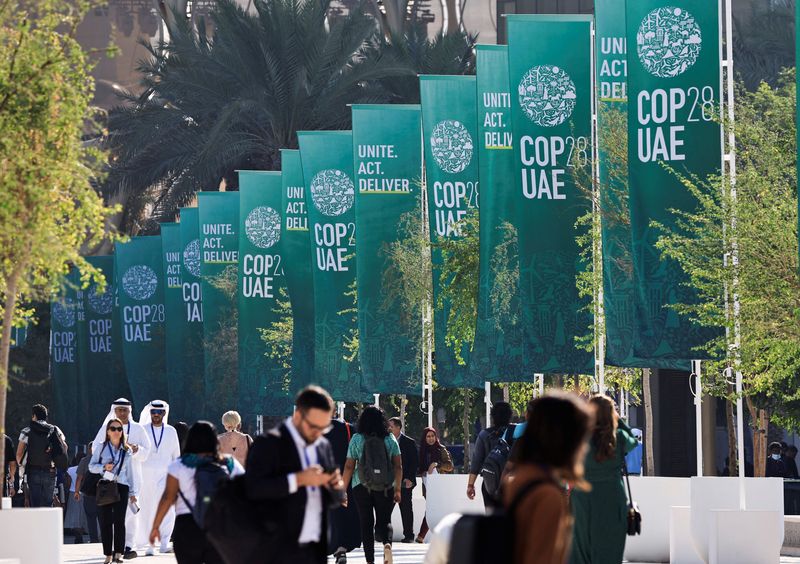4/4

© Reuters. FILE PHOTO: Delegates walk at the United Nations Climate Change Conference COP28 in Dubai, United Arab Emirates, December 8, 2023. REUTERS/Thaier Al Sudani/File Photo
2/4
By Kate Abnett and Valerie Volcovici
DUBAI (Reuters) – OPEC members are pushing against attempts to include language on “phasing out” fossil fuels in a COP28 climate deal, underlining the struggle over whether the summit can for the first time in 30 years address the future of oil and gas.
Negotiators and observers at the annual U.N. climate talks, pursuing a deal to tackle the worst impacts of climate change, said several OPEC members appeared to have heeded calls by the oil producer group to veto any deal to phase out fossil fuels.
In a letter dated Wednesday, OPEC Secretary General Haitham Al Ghais called on members to reject language targeting fossil fuels, saying “the undue and disproportionate pressure against fossil fuels may reach a tipping point with irreversible consequences”.
Al Ghais declined to comment on the letter but said OPEC wanted to keep the focus of the talks on reducing emissions, as opposed to picking energy sources.
“The world requires major investments in all energies, including hydrocarbons,” he said. “Energy transitions must be just, fair and inclusive.”
At least 80 countries are demanding a COP28 deal that calls for an eventual end to fossil fuel use, the top source of planet-warming emissions, to try to get on track to reach the goal of limiting global warming to 1.5 degrees Celsius.
But they face a struggle to persuade countries that rely on oil and gas for revenue, many of which are instead promoting technologies like carbon capture, which is expensive and has yet to be proven at scale.
Tina Stege, climate envoy of the Republic of the Marshall Islands – one of the places worst affected by climate change, said any pushback on including a phase-out of fossil fuels risked the world’s prosperity.
“Nothing puts the prosperity and future of all people on earth, including all of the citizens of OPEC countries, at greater risk than fossil fuels,” said Stege, whose country chairs the High Ambition Coalition, a group of nations pushing for more ambitious emissions targets and policies.
“This is why the High Ambition Coalition is pushing for a phase out of fossil fuels, which are at the root of this crisis. 1.5 is not negotiable, and that means an end to fossil fuels,” she said in a statement.
‘CRITICAL STAGE’
After a week of technical talks, the negotiations now have ministerial input before the scheduled end of the summit on Tuesday – the last phase when countries wrestle to find consensus over the wording regarding fossil fuels.
The latest version of the negotiating text includes a range of options – from agreeing to a “phase out of fossil fuels in line with best available science”, to phasing out “unabated fossil fuels”, to including no language on them at all.
Germany’s state secretary and special envoy for climate action, Jennifer Morgan, said counties were now “moving into the critical stage of negotiations”.
“It is time for all countries to remember what is at stake and to be ready to send the signal the world needs at this critical moment of the global climate crisis. I am concerned that not all are constructively engaging.”
Asked about the OPEC letter, COP28 Director General Majid Al Suwaidi avoided the term “fossil fuels” but said the United Arab Emirates, as president of the summit, wanted a deal to get the world on track for 1.5 degrees.
“Our COP president has been very clear from day one that he wants to achieve an outcome that puts us clearly on track for 1.5 degrees,” he told a news conference. “He clearly wants to see an outcome that is as ambitious as possible and we believe we are going to deliver it.”
Negotiators have a tough job ahead.
Wael Aboulmagd, special representative to the COP27 Egyptian presidency, said there were too many options in the text on fossil fuels, adding there was also deadlock in talks on measures to help nations adapt to extreme weather and other climate change impacts.
“We still have some serious issues with adaptation. We are still way behind on that.”
Source: Investing.com



























